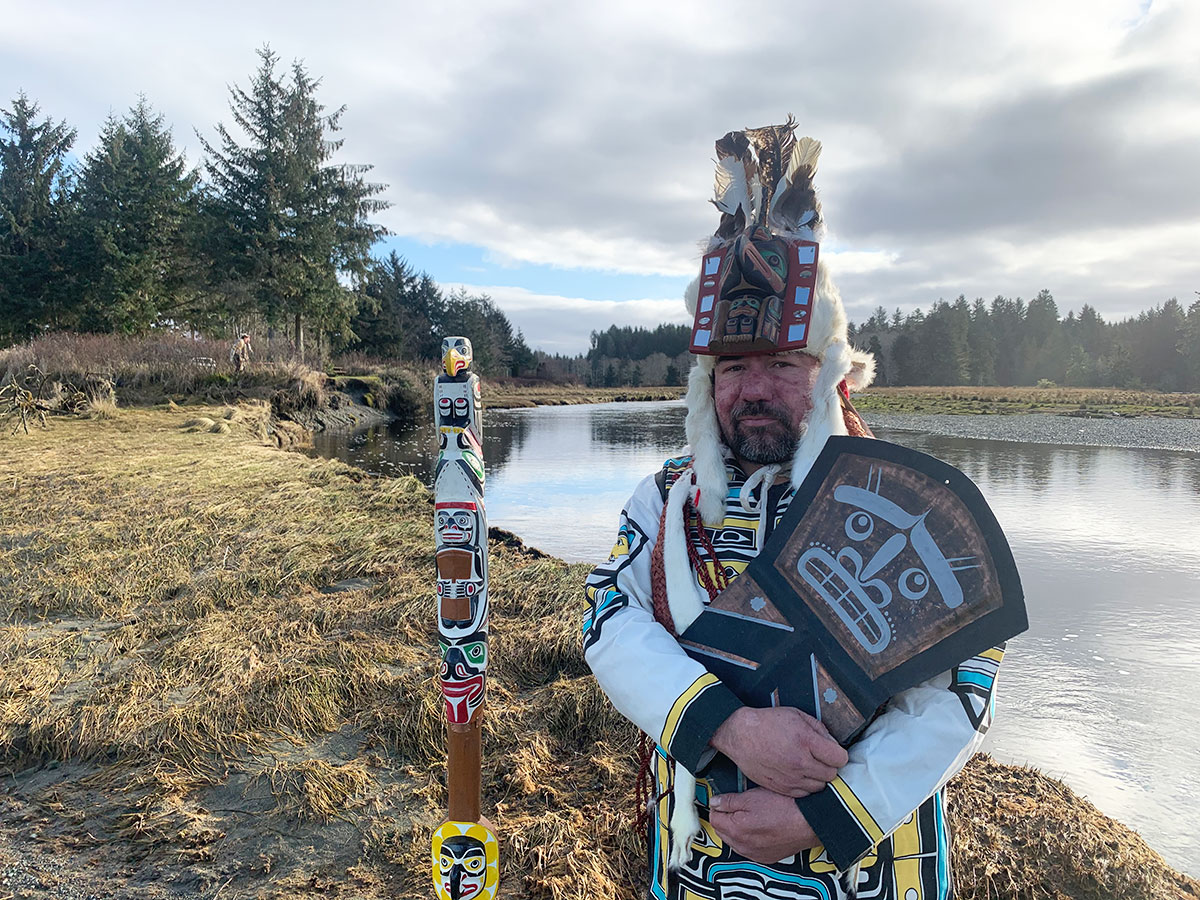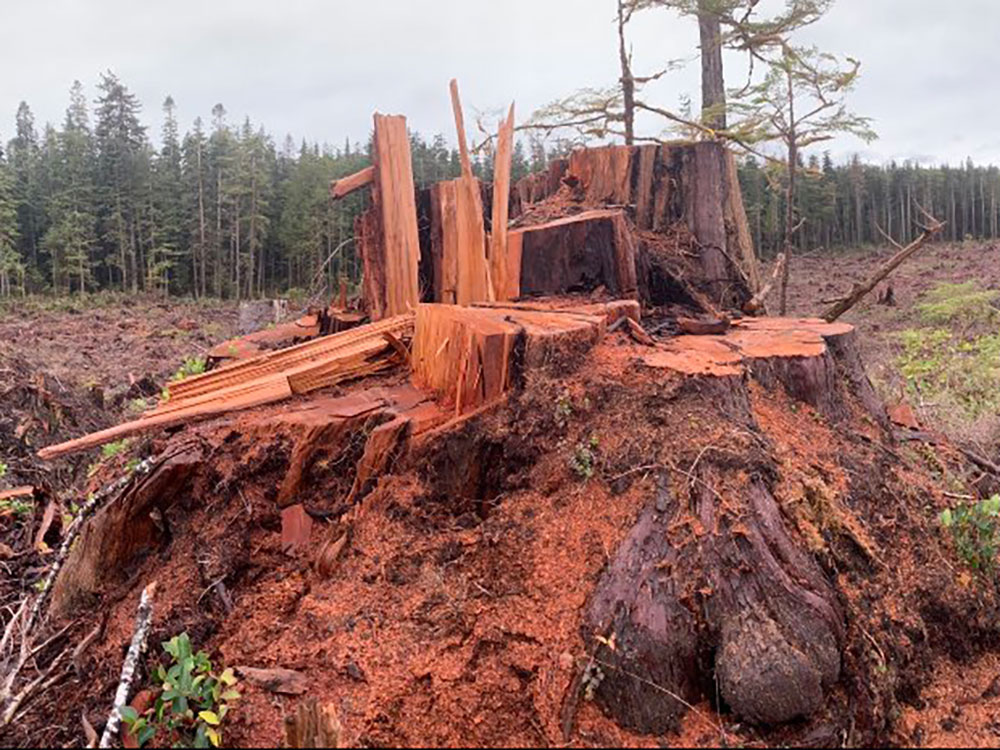Lemare Lake Logging Ltd., working on behalf of Kwakiutl First Nation band council, logged a tract of old-growth forest in Kwakiutl territory on northern Vancouver Island after receiving a cease-and-desist order from hereditary leaders.
Hereditary Chief Walas 'Namugwis David Mungo Knox says that he tried to engage with the province and the parties in question to little effect, and that the nation has called for an old-growth moratorium for over a decade.
“I’m trying to save what we have left for the future, because this is our ancient old growth. Once you've clear cut it, that's it,” he said. “I'm really disappointed.”
The six cutblocks in question are located within the Douglas Treaty area, a coastal strip of territory reaching from Port McNeil to Port Hardy where the nation has treaty rights to hunt and fish. Knox said they include large tracts of red cedar, salmon spawning habitat and active bear dens, and that they reflect rare, old-growth forest in areas that have been heavily logged.
Two cutblocks include forests identified for priority deferral by the Old-Growth Technical Advisory Panel.
The blocks are located in a tree farm licence belonging to one of B.C.’s biggest logging companies, Western Forest Products, but that licence is being held by the Kwakiutl Forestry GP Corp., a company founded and owned by the Kwakiutl First Nation’s band council. Lemare Lake Logging Ltd., a company based in Port McNeil, and its subsidiary, Lion’s Gate Forestry Products Ltd., were hired by the council to provide forestry management services and to log the cutblocks, according to Lemare’s president and CEO, Eric Dutcyvich.
“All of the timber felling has been completed,” said Dutcyvich. “The cut timber is being loaded and hauled and delivered into the marketplace.”
Knox says he has heard blasting in the region of the cutblocks this week, and believes the logging may be ongoing.
Knox and other hereditary leaders say they were not adequately consulted by the council, Lamere Lake Logging or Western Forest Products before the operations began. Now they’re calling for a moratorium on logging remaining old-growth forests in their territory, until a “fulsome, full community discussion can be held,” according to a press release from the Chiefs.
The Kwakiutl First Nation band council declined The Tyee’s request for comment.
“Every aspect of this program was evaluated by the nation and third-party professionals to meet and exceed environmental, cultural and industry regulatory requirements,” Lemare’s subsidiary, Lion’s Gate, stated in a media release.
The Kwakiutl First Nation has a long history of hereditary governance shaped by matriarchal lines, and rooted in an ongoing potlatch tradition, where every family clan and its line of descendents has a head Chief. It also has a band council administration established by the Indian Act which is elected by the community. Knox says recent tensions around old growth point to the importance of respecting hereditary jurisdiction.
“The government divided us with the Indian Act,” he said. “Back in the day when we all shared the resources, we had our own laws.”
Last November, Knox launched the Kwakwa̱ka̱'wakw Hereditary Chiefs Confederation, bringing together hereditary leaders across northern Vancouver Island.
“We're all going to collectively work together, because we're all struggling with the same problem,” he said.

‘It's our responsibility as a hereditary leadership to look after our traditional territory’
Last November when the logging was still active, the Kwakwa̱ka̱'wakw Hereditary Chiefs Confederation issued a cease-and-desist order addressed to Lemare Lake Logging’s CEO, Eric Dutcyvich, Western Forest Products and the Kwakiutl band council.
“If you do not cease the aforementioned activity legal counsel will be secured to uphold our laws against you,” the letter read in part.
Two days later, the band council responded with legal notice written by Rory Morahan of Morahan & Company law offices, stating that the order was invalid and that “the elected Chief and council have the sole authority and jurisdiction, on behalf of the Kwakiutl band council, to consider resource extraction within the traditional territories and the lands described in the Douglas Treaty.”
Rory Morahan declined the Tyee’s request for comment.
Hereditary Chief Alan Hunt disagrees that the order was invalid, and with Morahan’s premise. “The names of the houses and all that stuff, all go back to time immemorial,” he said. “It’s tied directly to the land from which it originated.
“It's our responsibility as a hereditary leadership to look after our traditional territory.”
Alan Hunt’s mother, Terena Hunt, was the senior governance administrator with the Kwakiutl band council until last month. Her father, Alfred Hunt, was a Hereditary Chief and signatory of the cease-and-desist letter before he passed away in December. He built the nation’s Big House, she said. “To disregard his hereditary authority is just horrible.”
For Hunt, that authority is central to Kwakiutl laws and culture. “Since the beginning of our time, our creation story, our cultural and traditional structure was born,” she said. Adding that structure was centfred on the potlatch system, which served as “our banking system — everything.” Potlatches were held in the Tsaxis Gukzdwi, or Big House. “Our entire social structure happens in that house,” she said. “The leaders of that house, therefore, are the leaders of the structure itself.”
“A lot of people still hold that respect for the Hereditary Chiefs.”
Hunt noted that family groups within the tribe all had different roles and responsibilities, and it was the Hereditary Chief’s role to ensure the nation’s health and wellness. “That also included territory management,” she said.
Now Hunt sees a movement underway to restore nations’ governance autonomy. “We have the right to have a role in what goes on in our own lives,” she said.
Canadian courts’ recognition of Indigenous governance — whether band council or hereditary leadership — remains in a grey zone, said Kate Gunn, partner with First Peoples Law LLP. “I think that's largely just because of the impacts of colonization, in terms of the division of Indigenous governments under the Indian Act, and also just the suppression of Indigenous laws,” she said.
When recognizing Aboriginal title and treaty rights, Gunn says courts tend to look to the nation — the rights holder — to determine who their leaders are. “It really is the group that's asserting the right that is the one that you look to to define who they are and who holds it,” she said. But ultimately, she added, rights holders and governance systems alike don’t need the Canadian court to be valid.
“It’s not dependent on a court determination saying ‘this is the correct right holder’ for a group to say, ‘under our own laws and our own history, we know that this is how we're a part of us,’” she said.
In the meantime, on Kwakiutl territory, industry and the province tend to cite a hands-off approach to working with governance systems.
For example, in an emailed statement, the Ministry of Forests said, “we respect the diversity of opinions within Indigenous communities regarding leadership and communal decision-making; it is important that governance matters of the Kwakiutl First Nation be resolved by the Kwakiutl people — that is central to self-determination.”
But the province also confirmed that they issued a harvesting permit to the Kwakiutl First Nation to log the cutblocks in question. They did not clarify whether that meant the band council.
Tensions in the Big House
A week after the cease-and-desist letter was filed, Knox and other Hereditary Chiefs held a meeting in the nation’s Big House, in part to discuss with leadership the logging that was underway. Lemare Lake’s Eric Dutcyvich was the only logging company representative in the room. During the meeting, Knox stood and asked Dutcyvich to leave. “I know that you’re a forestry advisor [to the band council] but you’re not welcome here at this moment, we’re dealing with our business internally,” he said.
Dutcyvich stood and said he would “come back when this group wants to hear what actually transpired.”
“I don’t like having my credibility brought into question with this nation,” he added before leaving the big house.
When asked by The Tyee in January to comment on the incident, Dutcyvich said, “I'm very respectful of Kwakiutl rights and title, I'm very respectful of their traditions and I’m very respectful of the community’s governance processes. And that includes my conduct in the Big House.”
Dorothy Hunt, a Kwakiutl member and former band councillor who works with the Kwakwa̱ka̱'wakw Chiefs Confederation, questions whether that respect extends to hereditary governance, noting that logging took place while Chief David Knox was away in Montreal attending COP15.
“Being asked by the hereditary leaders to cease and desist and then to go back in while David's out of town,” she said, “shows me that Lemare Logging certainly doesn't want to have a business relationship with the hereditary leaders in a respectful way.”
When asked about his approach to working with Kwakiutl governance systems, Dutcyvich suggested that working with the band council means taking hereditary leadership into account.
“My observations of the Kwakiutl Nation is that elected leadership takes into account the wisdom of their Elders, their hereditary [leadership] and all of the community members and tries to make decisions based on what's best for the collective, not just for now, but also for the future,” he said.
“It's not my place to engage in nation politics,” he added.
Dutcyvich also noted that recent cutblocks reflect the first time the Kwakiutl First Nation has logged their territory in the last 18 years. “We spent probably close to three years working with the nation, putting those agreements in place and helping them work with the province to generate that tenure opportunity,” he said.
In an emailed statement, Western Forest Products said they do not receive proceeds from leasing the tenure to Lemare Logging Ltd, but added that they “follow guidance from the province on how we should engage with First Nations in connection with our operations in their territories.” When it comes to logging on Kwakiutl territory, they suggested that they work with band council leadership, adding that their approach “follows an information sharing process with the elected Chief and council for the Kwakiutl First Nation and their representatives.”
‘An ongoing battle’
Recent tensions around logging in Kwakiutl territory follow the nation’s long struggle to assert jurisdiction over their forests, which the province has consistently failed to recognize.
About a decade ago, the nation called on the province to issue a moratorium on old-growth logging in their Douglas Treaty lands. That request wasn’t followed.
“That's really been an ongoing battle that we have with [the Ministry of Forests], because they continue to provide permits to Western Forest Products, Lemare Logging and others,” said Dorothy Hunt.
In 2015, BC’s Supreme Court found that the province had breached its duty to adequately consult the nation on forestry operations in their territory, including a decision to turn Crown-held forest tenure into Western Forest Products’ private land. The nation claimed this land held important archaeological resources for identifying village sites. The court called on the province to engage in “deep consultation” on future decisions that could affect its treaty rights and its Aboriginal title rights that extend beyond the treaty area.
But the industry’s problems persisted. Recently, road-building and logging operations have led to landslides and sloughs and tree blowdowns, sending debris into the salmon-bearing Cluxewe River. In one area, sediment buildup from logging caused the river to change course.
In 2020 Chief David Knox sent an email, including the name of the former Chief, Ross Hunt Jr., and with his support, to former forestry ministers Doug Donaldson and later Katrine Conroy, among other elected officials, calling them to place all remaining old-growth logging permits under deferral within the main watersheds in the territory.
The Ministry of Forests said the letter had been “received by the ministry from a personal Hotmail account.” David Knox confirmed that he sent the letter from his account.
The province added that the letter “was also never mentioned or referred to during many subsequent engagements with the Kwakiutl First Nation.”
But after the province’s Old-Growth Technical Advisory Panel released its findings, those requests finally began to get traction. Senior officials began to engage with the council, said Dorothy Hunt, who sat on council at the time. “They were great,” she said. “They said, come back with your map, tell us what areas you see that you want protected and let’s sit down and go over them.”
Then a 2021 election brought a shift in band council leadership. Hunt, who lost her bid for Chief to Grace Wilson, no longer held a seat on council. “I don’t know if this council has stopped those conversations,” she said.
“We continue to reach out to the elected council,” she said. “They won't return our phone calls, emails, anything.”
The current council declined to provide a response to Hunt’s claim.
In an emailed statement, the Ministry of Forests said the province “continues to engage” with the nation about old-growth deferrals. “We understand that the nation has been reviewing permit applications on a case-by-case basis,” the statement said.
Hunt sees opportunities for band council leadership and Hereditary Chiefs to collaborate.
“There are so many great examples of elected and hereditaries having co-operation agreements,” Hunt said. To her, that means “sitting down and going over what — for logging or fishing or the extraction of natural resources — should be a discussion that the elected and the Hereditary Chiefs have together.”
Hereditary Chief Alan Hunt also sees potential for common ground. He grew up in Port Hardy and worked as a commercial salmon seiner. “I've contributed firsthand to resource extraction revenue. So I get it,” he said. “It’s something that puts food on the table, and not everybody is pleased with it all of the time.”
Today he works in ecotourism, where he sees opportunities to generate revenue for critical needs like housing while protecting old-growth forest.
But he’s concerned that the council’s current approach to logging could close that window.
“I'm just worried that we're pigeon-holing ourselves,” he said. “Why are we constantly fighting to try and find a way to make resource extraction work in a way that pleases everybody when there is other stuff that we could be doing?” ![]()
Read more: Indigenous, Rights + Justice, BC Politics, Environment

















Tyee Commenting Guidelines
Comments that violate guidelines risk being deleted, and violations may result in a temporary or permanent user ban. Maintain the spirit of good conversation to stay in the discussion and be patient with moderators. Comments are reviewed regularly but not in real time.
Do:
Do not: